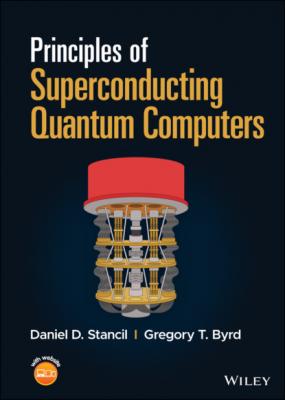Principles of Superconducting Quantum Computers. Daniel D. Stancil
Чтение книги онлайн.
Читать онлайн книгу Principles of Superconducting Quantum Computers - Daniel D. Stancil страница 12
 alt="upper X Math bar pipe bar symblom 1 mathematical right-angle equals Start 2 By 2 Matrix 1st Row 1st Column 0 2nd Column 1 2nd Row 1st Column 1 2nd Column 0 EndMatrix StartBinomialOrMatrix 0 Choose 1 EndBinomialOrMatrix equals StartBinomialOrMatrix 1 Choose 0 EndBinomialOrMatrix equals Math bar pipe bar symblom 0 mathematical right-angle period"/> (1.24)
alt="upper X Math bar pipe bar symblom 1 mathematical right-angle equals Start 2 By 2 Matrix 1st Row 1st Column 0 2nd Column 1 2nd Row 1st Column 1 2nd Column 0 EndMatrix StartBinomialOrMatrix 0 Choose 1 EndBinomialOrMatrix equals StartBinomialOrMatrix 1 Choose 0 EndBinomialOrMatrix equals Math bar pipe bar symblom 0 mathematical right-angle period"/> (1.24)
We see then that the X gate is a “bit flip” gate, and transforms |0⟩ into |1⟩ and vice versa. This, then is the analog of the classical NOT gate. You should verify the following results from applying Y,Z, and H gates:
In addition, it is interesting to note that each one of these matrices is its own Hermitian conjugate. Consequently, these four gates have the property that applying them twice gives the identity matrix:
Note that while X,Y, and Z gates transform between the |0⟩ and |1⟩ states, the Hadamard gate actually creates a superposition state, and therefore will prove to be particularly useful. The states resulting from applying H to the basis states are given their own names:
Multiple gates can be sequentially applied to a qubit by matrix multiplication:
This expression says that we start with the ground state, then apply a Hadamard gate, followed by a Pauli-Y and then a Pauli-Z. Note that this process conceptually moves from right to left. This computation can be represented by a quantum circuit diagram as shown in Figure 1.3. Note that the process moves from left to right on the circuit diagram: we begin with the ground state on the left, then apply a Hadamard gate, a Pauli-Y gate, and a Pauli-X.
Figure 1.3 Circuit representation of Eq. (1.31). In a quantum circuit diagram, the operation goes from left to right, while the matrix expression is shown going from right to left. The final box is a measurement in the standard basis, resulting in a classical bit.
Finally, after performing a quantum calculation, we generally measure each qubit. The symbol for a measurement is shown as the last element in Figure 1.3. This action collapses the final state onto one of the basis states. The outcome of a measurement is a classical bit that is stored in a classical register. “Quantum wires” are denoted by solid lines, and “classical wires” are denoted with double lines. A quantum wire simply represents a time-interval over which the state is kept unchanged.
1.5 Two-Qubit Gates
It is also possible to have gates with multiple qubits as inputs. However, unlike classical multi-bit gates, the fact that quantum gates are reversible requires that there must be the same number of output qubits as input qubits. In this section we will explore some common two-qubit gates.
1.5.1 Two-Qubit States
When we consider a system with two qubits, we don’t just consider each qubit independently of the other. Instead, this forms a two-qubit system with its own set of basis states. If we know the state of each qubit, then the combined two-qubit state is described using the tensor product of the two state vectors, defined as follows:
Using the standard basis, the basis states for a two-qubit system are defined by combinations of the |0⟩ and |1⟩ states: